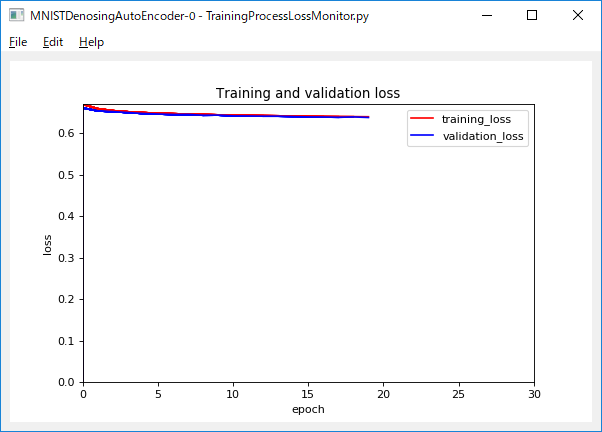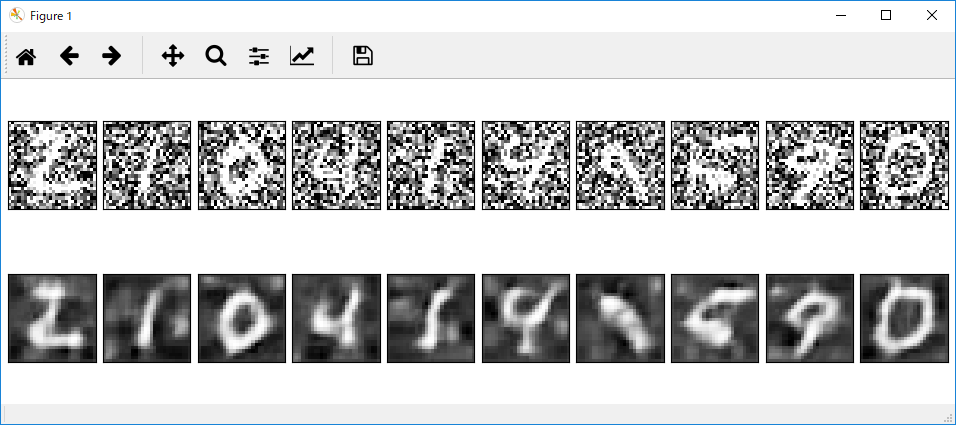|
SOL4Py Sample: MNISTDenoisingAutoEncoder
|


#******************************************************************************
#
# Copyright (c) 2018-2019 Antillia.com TOSHIYUKI ARAI. ALL RIGHTS RESERVED.
#
# This program is free software: you can redistribute it and/or modify
# it under the terms of the GNU General Public License as published by
# the Free Software Foundation, either version 3 of the License, or
# (at your option) any later version.
#
# This program is distributed in the hope that it will be useful,
# but WITHOUT ANY WARRANTY; without even the implied warranty of
# MERCHANTABILITY or FITNESS FOR A PARTICULAR PURPOSE. See the
# GNU General Public License for more details.
#
# You should have received a copy of the GNU General Public License
# along with this program. If not, see <http://www.gnu.org/licenses/>.
#
#******************************************************************************
# 2019/05/13
# MNISTDAE.py
# This is based on the following sample program.
# https://keras.io/examples/mnist_denoising_autoencoder/
# See also https://keras.io/datasets/
# encodig: utf-8
import sys
import os
import time
import traceback
import matplotlib.pyplot as plt
import numpy as np
import keras
import tensorflow as tf
from keras.utils import np_utils
sys.path.append('../')
from MNISTAutoEncoder.MNISTAutoEncoder import *
# Define MNISTDenosingAutoEncoder derived from MNISTAutoEncoder,
# because there are quite similar interfaces between them,
# to load_data_set, to create a model, to compile, to train and
# to predict methods, apart from the input_data to be noise-injected or not.
class MNISTDenosingAutoEncoder(MNISTAutoEncoder):
##
# Constructor
def __init__(self, epochs, mainv=None, ipaddress="127.0.0.1", port=8888):
super(MNISTDenosingAutoEncoder, self).__init__(epochs, mainv, ipaddress, port)
# Weight file will be created in the current_dir, so you should define
# set_weigth_filename method in each model class.
# Build a full path name to a weight_file name from self.__class_.__name__ and currend_dir.
def set_weight_filepath(self):
weight_file = self.__class__.__name__ + "_" + str(self.dataset_id) + ".h5"
current_dir = os.path.dirname(os.path.abspath(__file__))
self.weight_filepath = os.path.join(current_dir, weight_file)
print("weight_filepath:{}".format(self.weight_filepath))
# Override supepr().load_dataset method to inject noise to the original x_train and x_test data.
def load_dataset(self):
super().load_dataset()
# Inject noise to the orginal dataset self.x_train and self.x_test.
self.x_train = self.inject_noise_into(self.x_train)
self.x_test = self.inject_noise_into(self.x_test )
# Redefine your own noise injection method if required.
# See: https://keras.io/examples/mnist_denoising_autoencoder/
def inject_noise_into(self, data):
# Make Gaussian noise by using np.random.normal of size=data.shape
noise = np.random.normal(loc=0.5, scale=0.5, size=data.shape)
noised = data + noise
return np.clip(noised, 0.0, 1.0)
#################################################
#
if main(__name__):
try:
app_name = os.path.basename(sys.argv[0])
epochs = 10
if len(sys.argv) == 2:
epochs = int(sys.argv[1])
model = MNISTDenosingAutoEncoder(epochs)
model.build()
model.predict()
model.show_images()
except:
traceback.print_exc()
Last modified:20 Sep. 2019

